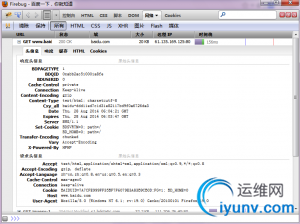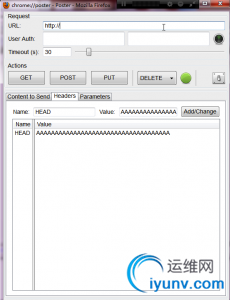|
|
从Apache切到Nginx需要保持日志格式统一,以便兼容之前的数据统计脚本
现在Apache的日志格式为:
LogFormat "%h %t %m %U %q %>s %{HEAD}i %D"
1
| LogFormat"%h %t %m %U %q %>s %{HEAD}i %D"
|
说明:
%h:客户端IP地址
%t:时间(标准英语格式)
%m:请求的方法(GET,POST)
%U:请求的URL路径,不包含查询字符串
%q:查询字符串
%>s:请求的最终状态
%{HEAD}i:请求头信息
%D:服务器处理请求所用时间,微秒为单位
对应的Nginx日志格式为:
log_format main '$remote_addr [$time_local] $request_method $uri ''$query_string $status ''$http_head $request_time ';
1
2
3
| log_format main '$remote_addr [$time_local] $request_method $uri '
'$query_string $status '
'$http_head $request_time ';
|
其中Apache里的%{HEAD}i这个参数里的HEAD是在程序里自定义了一个header,在Nginx里面取这个HEAD用到的是$http_head参数,head就是自定义的header名称HEAD, Nginx里面需要小写,在这里走了不少弯路。
用firebug获取http header,如下图

有两部分内容,一个是响应头,一个是请求头,请求头是客户端发送给服务器的,包括Requst Line及HTTP Header,响应头是服务器返回给客户端的,包括Status Line及HTTP Header。关于http header的说明,这里有一篇很好的文章可以参考。
在Nginx里面可以用$upstream_http_’header名称’来获取响应头信息,比 如$upstream_http_content_type将会获取到类似text/html; charset=utf-8的内容,说明返回的文件类型及编码格式。在我的需求中是要获取自定义的请求头的内容,需要使用$sent_http_’自定义 header名称’来获取,但我测试过程中没有取到,用$http_’自定义header名称’才取到,也许和Nginx版本有关,我的版本是 1.4.2。
另外,测试过程中用的是firefox的poster插件,可以自定义请求头,截图如下:

自定义一个header,然后输入URL,点GET即可发送带有自定义header的请求,在服务器端查看日志可以看到取到了‘AAAAAAAAAAAAAAAAAAAAAA’.
附nginx.org里关于log_format参数的说明,英文不好,看着费劲。
The ngx_http_core_module module supports embedded variables with names matching the Apache Server variables. First of all, these are variables representing client request header fields, such as $http_user_agent, $http_cookie, and so on. Also there are other variables:
$arg_name
argument name in the request line
$args
arguments in the request line
$binary_remote_addr
client address in a binary form, value’s length is always 4 bytes
$body_bytes_sent
number of bytes sent to a client, not counting the response header; this variable is compatible with the “%B” parameter of the mod_log_config Apache module
$bytes_sent
number of bytes sent to a client (1.3.8, 1.2.5)
$connection
connection serial number (1.3.8, 1.2.5)
$connection_requests
current number of requests made through a connection (1.3.8, 1.2.5)
$content_length
“Content-Length” request header field
$content_type
“Content-Type” request header field
$cookie_name
the name cookie
$document_root
root or alias directive’s value for the current request
$document_uri
same as $uri
$host
in this order of precedence: host name from the request line, or host name from the “Host” request header field, or the server name matching a request
$hostname
host name
$http_name
arbitrary request header field; the last part of a variable name is the field name converted to lower case with dashes replaced by underscores
$https
“on” if connection operates in SSL mode, or an empty string otherwise
$is_args
“?” if a request line has arguments, or an empty string otherwise
$limit_rate
setting this variable enables response rate limiting; see limit_rate
$msec
current time in seconds with the milliseconds resolution (1.3.9, 1.2.6)
$nginx_version
nginx version
$pid
PID of the worker process
$pipe
“p” if request was pipelined, “.” otherwise (1.3.12, 1.2.7)
$proxy_protocol_addr
client address from the PROXY protocol header, or an empty string otherwise (1.5.12)
The PROXY protocol must be previously enabled by setting the proxy_protocol parameter in the listen directive.
$query_string
same as $args
$realpath_root
an absolute pathname corresponding to the root or alias directive’s value for the current request, with all symbolic links resolved to real paths
$remote_addr
client address
$remote_port
client port
$remote_user
user name supplied with the Basic authentication
$request
full original request line
$request_body
request body
The variable’s value is made available in locations processed by the proxy_pass, fastcgi_pass, uwsgi_pass, and scgi_pass directives.
$request_body_file
name of a temporary file with the request body
At the end of processing, the file needs to be removed. To always write the request body to a file, client_body_in_file_only needs to be enabled. When the name of a temporary file is passed in a proxied request or in a request to a FastCGI/uwsgi/SCGI server, passing the request body should be disabled by the proxy_pass_request_body off, fastcgi_pass_request_body off, uwsgi_pass_request_body off, or scgi_pass_request_body off directives, respectively.
$request_completion
“OK” if a request has completed, or an empty string otherwise
$request_filename
file path for the current request, based on the root or alias directives, and the request URI
$request_length
request length (including request line, header, and request body) (1.3.12, 1.2.7)
$request_method
request method, usually “GET” or “POST”
$request_time
request processing time in seconds with a milliseconds resolution (1.3.9, 1.2.6); time elapsed since the first bytes were read from the client
$request_uri
full original request URI (with arguments)
$scheme
request scheme, “http” or “https”
$sent_http_name
arbitrary response header field; the last part of a variable name is the field name converted to lower case with dashes replaced by underscores
$server_addr
an address of the server which accepted a request
Computing a value of this variable usually requires one system call. To avoid a system call, the listen directives must specify addresses and use the bind parameter.
$server_name
name of the server which accepted a request
$server_port
port of the server which accepted a request
$server_protocol
request protocol, usually “HTTP/1.0” or “HTTP/1.1”
$status
response status (1.3.2, 1.2.2)
$tcpinfo_rtt, $tcpinfo_rttvar, $tcpinfo_snd_cwnd, $tcpinfo_rcv_space
information about the client TCP connection; available on systems that support the TCP_INFO socket option
$time_iso8601local
time in the ISO 8601 standard format (1.3.12, 1.2.7)
$time_local
local time in the Common Log Format (1.3.12, 1.2.7)
$uri
current URI in request, normalized
The value of $uri may change during request processing, e.g. when doing internal redirects, or when using index files.
参考:http://blog.51yip.com/apachenginx/1277.html
转载请注明:海布里 » 在Nginx中记录自定义Header |
|